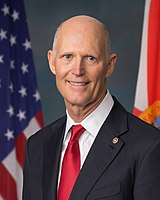
Republican Party of Florida
The Republican Party of Florida (RPOF) is the affiliate of the Republican Party in the U.S. state of Florida. Florida was dominated by the Democratic Party for most of its history (like most southern states). The Republican Party has rapidly gained ground in recent decades. It controls the majority of Florida's U.S. House seats, both U.S. Senate seats, the governorship, and has supermajorities in both houses of the state legislature.
Republican Party of Florida
1867
420 E. Jefferson Street
Tallahassee, FL 32301
Florida College Republicans
Florida Young Republicans
Florida Teen Age Republicans
Florida Federation of Republican Women
![]() 5,158,753[1]
5,158,753[1]
History[edit]
Harrison Reed organized the Union Republican Club in Jacksonville and sent a delegation to the National Union National Convention.[3] After the American Civil War black Republicans mainly joined the Union League organized by Daniel Richards and William U. Saunders. Richards was able to have pro-black rights resolutions passed at conventions which Reed stated were "pandering to Negroes".[4]
Richards, Saunders, and Liberty Billings campaigned for black support for the 1868 constitutional convention. Edward McPherson diverted printing contracts away from Radical Republican Jacksonville Florida Times, which later went bankrupt, to the moderate Florida Union. Richards also accused Freedmen's Bureau officials of working against him. Richards and Saunders' wing controlled a majority of the delegates at the constitutional convention.[5][6]
They submitted their proposed constitution to George Meade and held a nomination convention that selected a gubernatorial ticket of Billings and Saunders and Jonathan Clarkson Gibbs for Florida's at-large congressional district. However, Reed's faction, claiming that the Radicals did not have a quorum, held another meeting and received support from Meade, who later approved their constitution. The Radical's constitution made most local and state offices elected while the moderate's constitution made those offices appointed and reduce representation of black counties in the state legislature. The Florida Radicals failed to gather support in Congress for their constitution, with even Benjamin Butler supporting the moderate's constitution.[6] The constitution was approved by voters in 1868.[7]
Several of Florida's governors and U.S. senators were Republican after the Civil War, during the Reconstruction era. Afterwards, Florida's state politics were largely dominated by Democrats until Richard Nixon's Southern Strategy, which took advantage of objections to the advances of the American Civil Rights Movement. This resulted in a regional political realignment for the Southern United States.
In 1967, Claude R. Kirk, Jr. was the first Republican governor elected in the state since the 19th century Reconstruction era. And after Nixon's victory in 1968, the state only voted Democratic in presidential elections in 1976 (Jimmy Carter) 1996 (Bill Clinton), 2008 and 2012 (Barack Obama). The 2000 presidential election was decided by a margin of 537 votes out of approximately 6 million cast, giving George W. Bush the presidency over Al Gore.
The Florida Senate was still dominated by Democrats until 1992, when a majority of Republicans was elected. The Florida House of Representatives turned Republican after the November 1996 election. Since then, the number of Democrats in both chambers have continued to drop.
The Florida Legislature became the first legislature in any of the states of the former Confederacy to come under complete Republican control when the Republicans gained control of the House and Senate in the 1996 election. However, in the 2006 election the Democrats actually gained seats in the State House, the first instance of this occurring since the early 1980s.
Structure and composition[edit]
In the 2014 gubernatorial election, the Republican nominee was Governor Rick Scott. He defeated the Democratic nominee, former governor Charlie Crist, who was once elected as a Republican.
The Chairman of the Republican Party of Florida is Evan Powers, elected by RPOF members in January 2024.
The Republican National Committee (RNC) is responsible for promoting Republican campaign activities, developing and promoting the Republican political platform, as well as coordinating fundraising and election strategy. Senator Mel Martinez of Florida is the party's former General Chairman. Michael Whatley is the current Chairman of RNC. The chairman of the RNC is chosen by the President when the Republicans have the White House and otherwise by the Party's state committees. The RNC, under the direction of the party's presidential candidate, supervises the Republican National Convention, raises funds, and coordinates campaign strategy. On the local level there are similar state committees in every state and most large cities, counties and legislative districts, but they have far less money and influence than the national body.
The Republican House and Senate caucuses have separate fund raising and strategy committees. The National Republican Congressional Committee (NRCC) assists in House races, and the National Republican Senatorial Committee (NRSC) in Senate races. They each raise over $100 million per election cycle, and play important roles in recruiting strong state candidates. The Republican Governors Association (RGA) is a discussion group that seldom funds state races.

